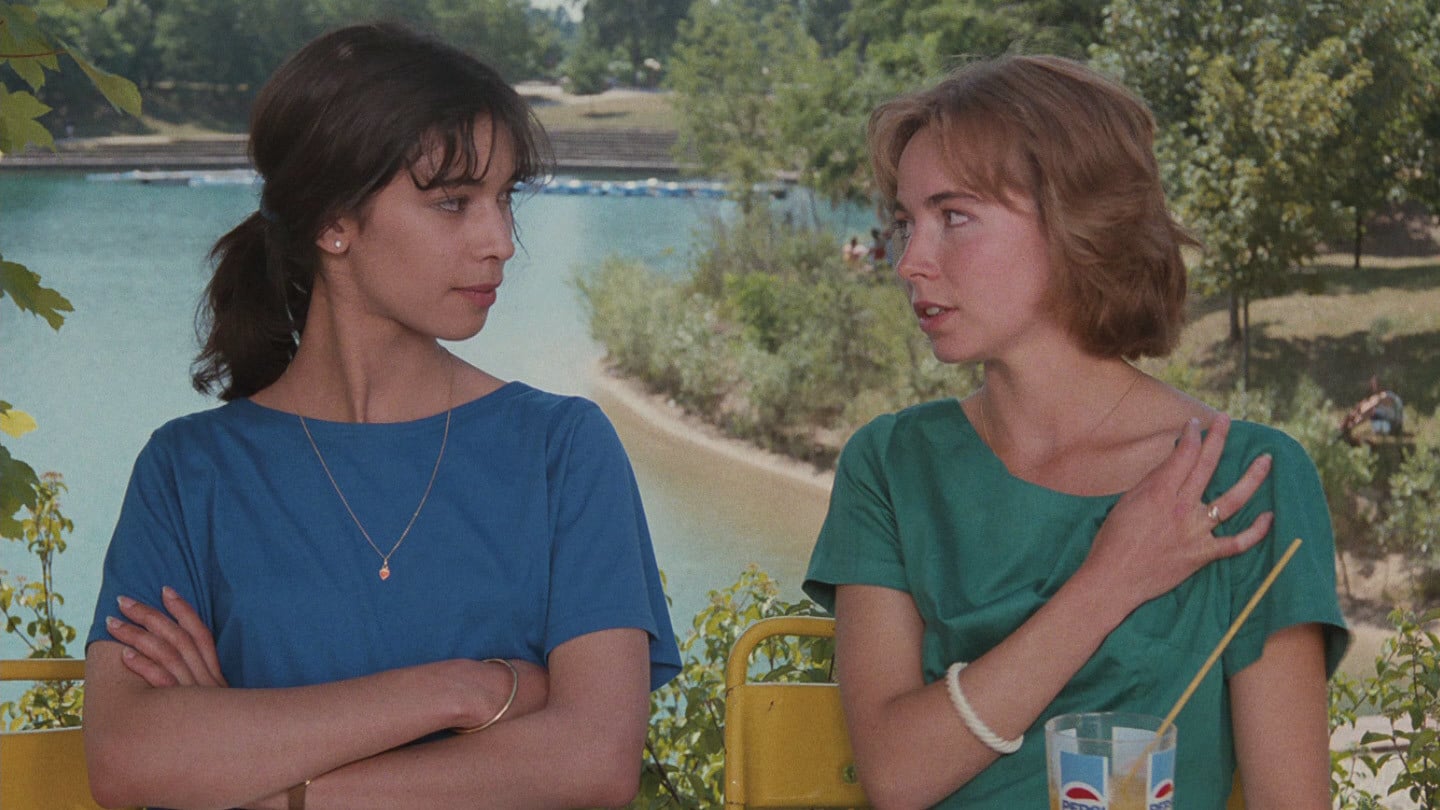
L’Ami De Mon Amie, literally “the friend of my friend” but given the title Boyfriends and Girlfriends in English, is the 6th in Eric Rohmer’s Comedies and Proverbs series. Set in a town just on the outskirts of Paris, it focuses on the budding friendship between two young women embarking on their professional careers (Blanche played by Emmanuelle Chaulet and Lea played by Sophie Renoir) as well as their love interests (Fabien played by Eric Veillard and Alexandre played by François-Eric Gendron).
Like most of Rohmer’s works, this one is highly dialogue driven, with an emphasis on the characters’ inner workings, their attitudes, beliefs, expectations, longings, and disappointments and how these play out in their relations with one another. Lea is involved with a young man named Fabien but the relationship is faltering owing to Lea’s feeling that Fabien is too young and not attuned to her (often unspoken) needs. He doesn’t play along with her “little games” to test him, doesn’t take any initiative in the relationship or offer any resistance.
Blanche is a bit of a dreamer and also appears to have unrealistic expectations for her prospective partners. She takes an interest in a suave, charismatic, and clever engineer named Alexandre and fixates on this prospect despite several people, including Lea, telling her the match isn’t suitable. Between the two, Blanche seems the more innocent or pliable—easily believing everything that Lea tells her. Lea is a bit more willful, more habituated to telling little lies to get her way or test others.
Blanche also appears to suffer from a bit of neurosis, having on several occasions what almost appear to be bouts of panic or intense anxiety. One such bout occurs near the midpoint of the film when she and Fabien are spending the day on an outing while Lea is away. The two have great chemistry and Fabien begins to fall for Blanche. In one scene, the two are alone along a wooded path and the camera cuts away to the trees blowing in the breeze, the afternoon sun shimmering through the branches. When the camera returns to Blanche, she is unexpectedly crying. It’s a shot reminiscent of the scene in Rohmer’s Le Rayon Vert where Delphine is walking along a wooded path, the camera again shifting to the trees blowing in the wind, followed by a shot of Delphine leaning against a fence in tears.
These shots, the sudden cutting away from the ongoing dialogue to nature, no sound but the wind rushing through the trees, evoke strong sentiments of loneliness, isolation, the sense that we are alone here in this place, very small and vulnerable. It’s a sudden break from the world of people, relationships, feelings, into a void of sorts. The tears of the female characters reflect this—a sort of acknowledgement that all of these worries are inconsequential in the grand scheme of things and that the indecision of the protagonists, the desire for a certain type of relationship or feeling, can wind up leaving us alone, adrift, unsure of ourselves and our place in the world. The sudden burst of emotion from the female protagonists is difficult to watch but some of the most moving and genuine pieces of cinema I’ve seen.
Fabien comforts Blanche and describes to her a fantasy of meeting a girl in a forest clearing with nobody else around. The two come together, make love, and then drift apart again, without speaking a word, nameless, complete strangers. He says it is more a male fantasy than anything, though Blanche disagrees and says she’d have thought it more a female fantasy. This whole scene is likely the most poignant in the film and gets at what the characters seem to be lacking in their lives—the sort of ineffable, intangible, unbreakable merging of individuals to attain a sense of oneness, safety and security against unhappiness and misfortune. It’s always right there in front of us but never manifests in our actual relations with others, in large part owing to our own misguided ideas and self-sabotage, the ultimate source of our discontent. It’s in the quiet moments when everything extraneous falls away that we realize we are alone and that it is likely our own doing that Rohmer reminds of us with these scenes. They are what give his films their timeless quality.
Blanche ultimately refuses Fabien’s advances, in part due to her continued longing for the distant Alexandre but mostly because she does not wish to sabotage her friendship with Lea by having an affair with Fabien behind her back. The next morning she breaks things off entirely. When she meets with Lea again, she learns that Lea was attempting to find a replacement for Fabien but none of the men met her standards. After a brief reconciliation, Lea tells Blanche over lunch a few days later that she and Fabien have broken things off for good. They are joined by Alexandre, who spends most of his time conversing with Lea while Blanche sits awkwardly before leaving abruptly in anger. Alexandre reveals he never had feelings for her and goes on to try to pick up Lea after her breakup. He insults Blanche’s looks and puts on a (rather slimy) slick-guy facade to charm Lea, which seems to work.
There isn’t much to like in the characters here. All are rather egotistical, particularly Alexandre, quick to pick up and dump partners at the drop of a hat, yet can’t stand when the same happens to them. The young women come off as somewhat frivolous, demanding, and having unrealistic expectations. Blanche’s co-worker Adrienne (played by Anne-Laure Meury from Rohmer’s La femme de l’aviateur) is pretentious and conniving. The only seemingly genuine character is Fabien, who has a genuine love for Blanche and is honest about his feelings. The end of the film has the young women coming clean about their infidelities and the two new couples (Lea/Alexandre and Fabien/Blanche) coming together and reconciling, a sort of reaffirmation of the opening proverb: Les amis de mes amis sont mes amis.
This isn’t one of Rohmer’s best remembered films, but I keep coming back to it just for the dialogue, an exchange of unvarnished emotion, an exploration of human relationships and how they can be simultaneously genuine and pleasant, contrived and painful. It’s an exploration of ego, desire, loneliness, humility, and friendship. Despite so many vacillations, the overall tenor of the film is one of tranquility. Nothing is overblown or exaggerated. It serves as a great primer for how to deal with indecision, disappointments and betrayals in one’s relations.
